
Insect Safari At Cedar Grove
July 21st, 2016
Oh, Marlborough Forest. You are a pestilential place, but I love you.
On the evening of the 13th I went to Cedar Grove Nature Trail in North Gower, a sunset walk with camera in hand. I knew I was in the right place when eager deer flies swarmed my car. The first one bit me within 30 seconds of emerging, at which point I slathered myself with a thick layer of DEET like I should have done in the first place. I could hear them constantly buzzing around me everywhere I went, with the occasional louder zoom as a dragonfly whizzed by and picked one of them off.
There were a few more deer fly bites over the course of the evening. But that's nothing compared to what got my legs. I still don't know what it was, maybe wasps. Shortly after I stepped into a tall wildflower field something went up both pants legs and went to town on me. It didn't really hurt at the time, I assumed it was more deer flies. But by the next morning, I was swollen from my ankles almost to my knees and it hurt to stand.
For this somewhat steep entrance fee, I enjoyed the most gloriously insect-rich woodland in all of Ottawa/Gatineau. I don't know what it is about Marlborough Forest. I mean, there are insects you see everywhere. Everywhere has butterflies, everywhere has dragonflies, everywhere has mosquitos. This is not that. This is tiny weird red wasps, tiny weird blue wasps, micro moths, goldenrod crab spiders, mystery crab spiders, mystery bees, insects I don't even know how to categorize, and all of these in such numbers that it's as if the place is bursting at the seams with them. Often they crowd two or three to one flower. Maybe it's just the sheer size of the conservation area that allows it to be so rich and wild. Maybe it's the relative remoteness from urban development. I imagine that this is what the world must have been like before humans--before we razed the wilderness and sprayed insecticides all over it. This is what paradise must look like.
...well, except for the deer flies. And the wasps. And the fact that a significant fraction of those insects are looking to eat and/or parasitize the remainder. This is what paradise must look like to an entomologist, I mean.
Most of them, certainly the ones that fascinated me, were tiny insects. They made me ache for a good macro lens. I struggled to get these little beauties in focus and all of them required extensive digital sharpening. For whatever reason, just like the last time I shot insects at Cedar Grove, they were almost all on Black-Eyed Susans. They hunted atop Black-Eyed Susans, laid eggs on Black-Eyed Susans, munched on Black-Eyed Susans...
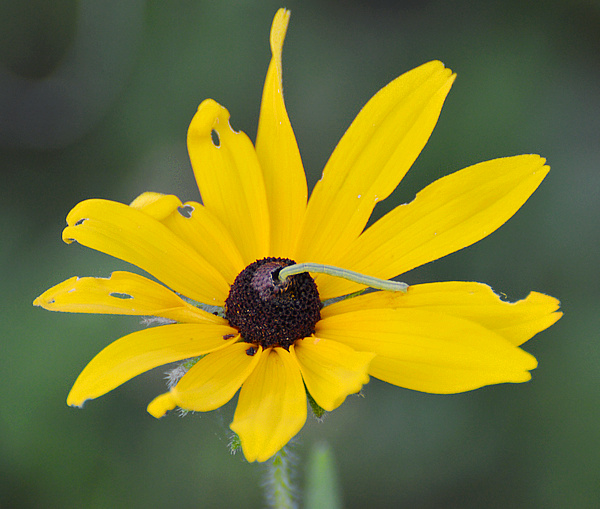
Small green inchworm-type caterpillars seemed to be everywhere I looked. Practically every other Black-Eyed Susan blossom had one on it. They were often sprawled at strange angles so as to look more like a fallen bit of plant litter than a creature, which likely helped fool predators. But I'm sure some of the predators noticed, as I did, that the little green sticks were awfully hungry.
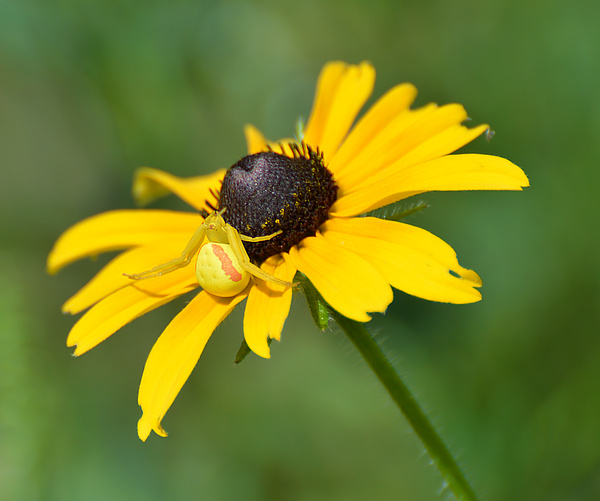
A Goldenrod Crab Spider. I find them strangely beautiful. I seldom spot them anywhere else, but at Cedar Grove Nature Trail, it's impossible to get away from them. They perch on flowers and wait for prey to stumble by, with their four front legs spread wide poised to grab.
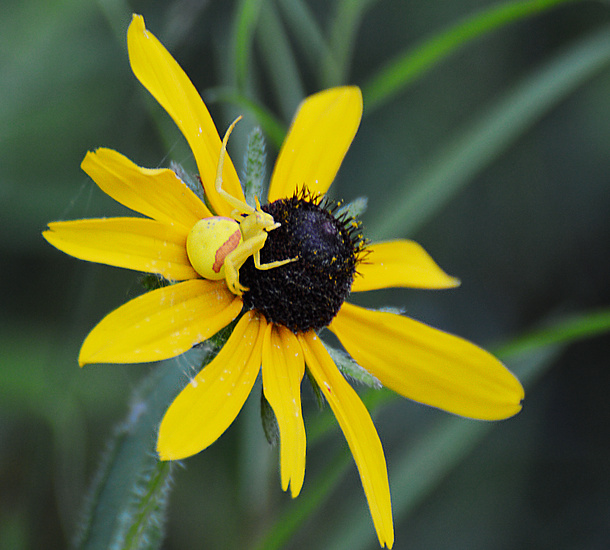
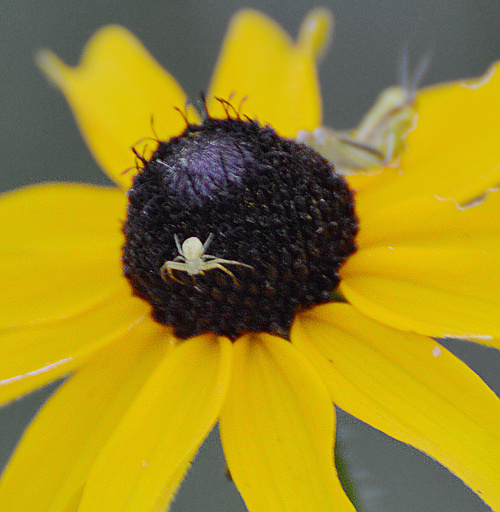
Eensy-weensy baby crab spider. That's a grasshopper behind it on the same flower. Regrettably, it was impossible to get both in focus.
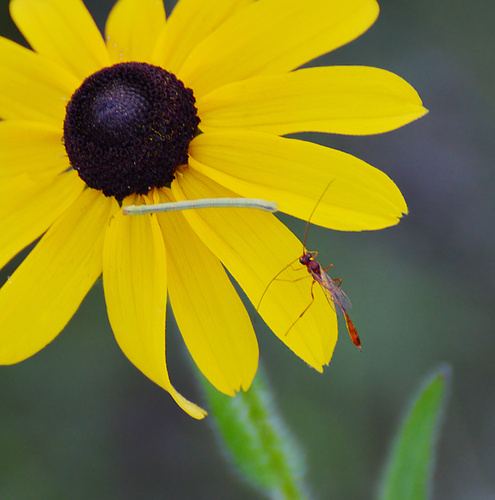
1680x1050 wallpaper
This spindly red thing is a parasitoid ichneumon wasp, and it may have designs on that caterpillar.
Even an expert entomologist probably could not tell me which ichneumon wasp. There are thousands of known species in North America and probably thousands more undescribed. (This fact makes me want to go back to university, study entomology and do my thesis at Cedar Grove trail. Except then someone else would have to do a thesis on me, entitled "How A Woman Was Literally Driven Insane By Deer Flies.") If you are an insect and there are a lot of your kind, nature has probably evolved a parasitoid wasp just for you--that is, a wasp who will give you to its young as food. Some, like the aptly named Tarantula Hawk, paralyze their victim, drag it into a nest burrow, and lay their eggs on it. Others pierce it with a stinger-like ovipositor and lay their eggs inside, in which case it doesn't notice a thing until the eggs hatch, and the larvae start eating it from the inside out.
Many thanks to the folks at What's That Bug for their help with this one!
And speaking of tiny wasps:
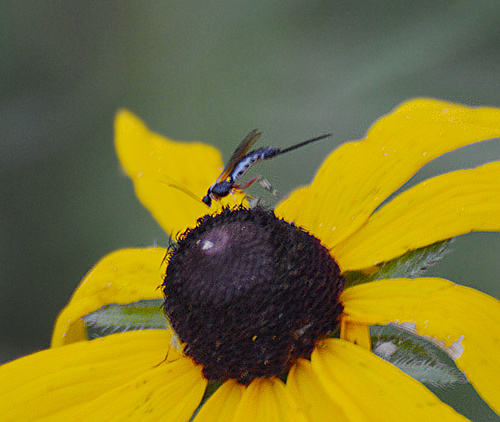
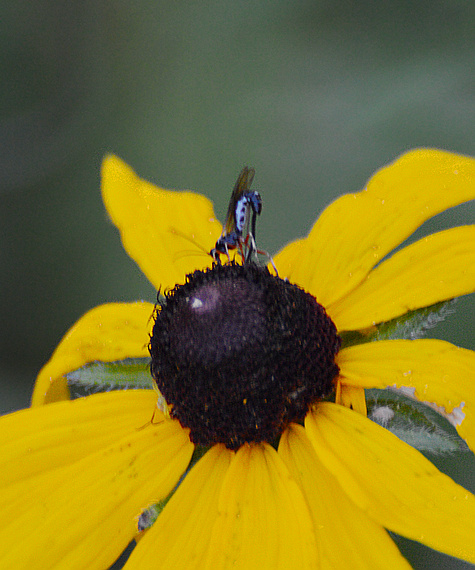
Another ichneumon wasp, I think. Like most ichneumons (but unlike the previous one), it has an ultra-long ovipositor, which it's using to dig into the seed head of a Black-Eyed Susan. Somewhere within that seed head, presumably, is the insect prey at which the wasp is targetting its eggs.
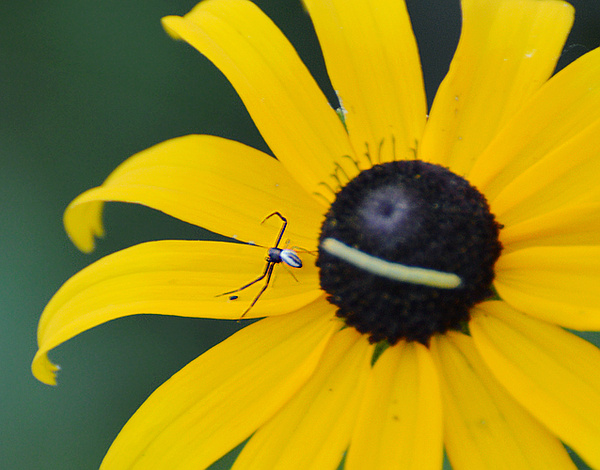
I think this is a male Goldenrod Crab Spider. The males are much smaller and less colorful than females.
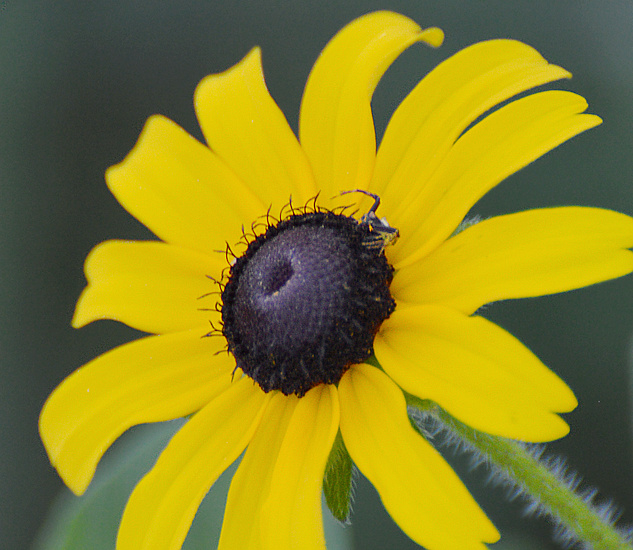
"Me? I'm just part of the flower."
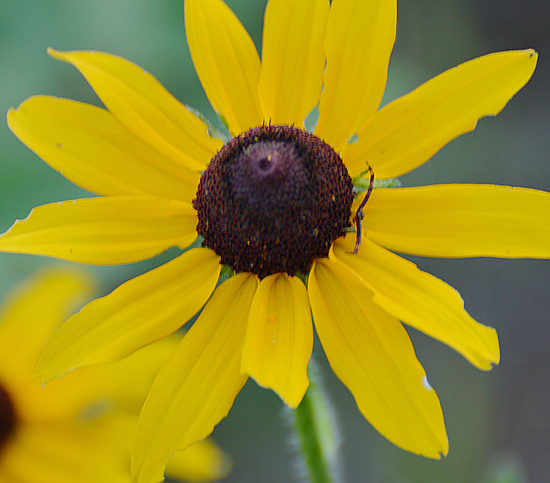
"...a stick. Just a bit of stick fallen down between these petals. Definitely not spider legs getting ready to grab you, nope."
And finally there are these two, that I don't even know how to categorize. The first one might be a micro-moth of some sort. More than any of the others, it made me long for a macro lens.
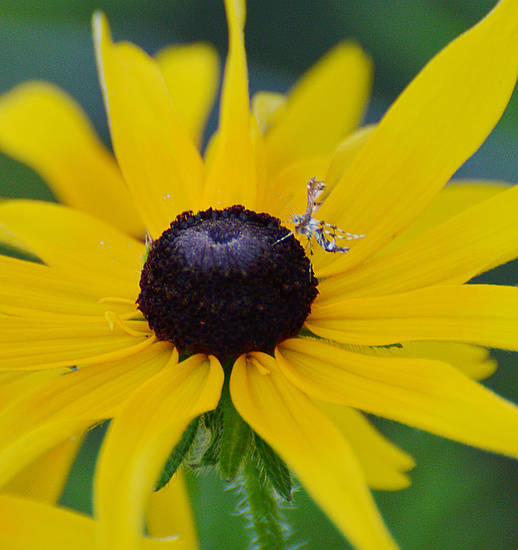
Magnified:
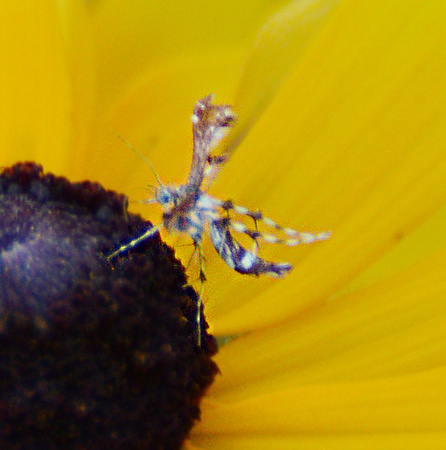
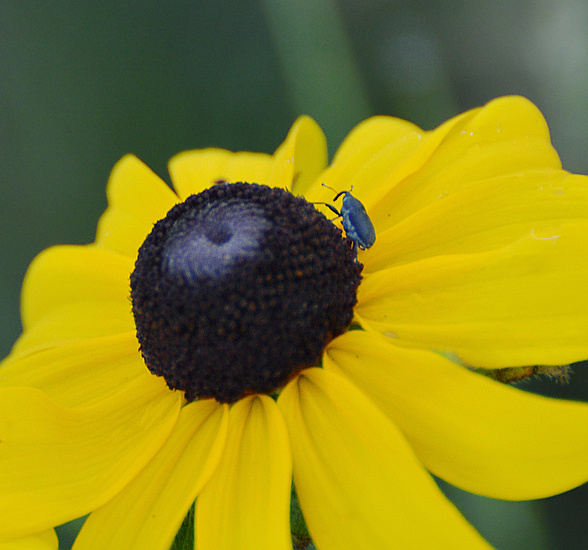
A complete mystery bug. Not glossy enough to be a beetle (I think?) and a bit too large and solitary to be an aphid. The photo captured well its matte-indigo coloration and that strange appendage (a tongue?) sticking out from its head.
July 21st, 2016
Oh, Marlborough Forest. You are a pestilential place, but I love you.
On the evening of the 13th I went to Cedar Grove Nature Trail in North Gower, a sunset walk with camera in hand. I knew I was in the right place when eager deer flies swarmed my car. The first one bit me within 30 seconds of emerging, at which point I slathered myself with a thick layer of DEET like I should have done in the first place. I could hear them constantly buzzing around me everywhere I went, with the occasional louder zoom as a dragonfly whizzed by and picked one of them off.
There were a few more deer fly bites over the course of the evening. But that's nothing compared to what got my legs. I still don't know what it was, maybe wasps. Shortly after I stepped into a tall wildflower field something went up both pants legs and went to town on me. It didn't really hurt at the time, I assumed it was more deer flies. But by the next morning, I was swollen from my ankles almost to my knees and it hurt to stand.
For this somewhat steep entrance fee, I enjoyed the most gloriously insect-rich woodland in all of Ottawa/Gatineau. I don't know what it is about Marlborough Forest. I mean, there are insects you see everywhere. Everywhere has butterflies, everywhere has dragonflies, everywhere has mosquitos. This is not that. This is tiny weird red wasps, tiny weird blue wasps, micro moths, goldenrod crab spiders, mystery crab spiders, mystery bees, insects I don't even know how to categorize, and all of these in such numbers that it's as if the place is bursting at the seams with them. Often they crowd two or three to one flower. Maybe it's just the sheer size of the conservation area that allows it to be so rich and wild. Maybe it's the relative remoteness from urban development. I imagine that this is what the world must have been like before humans--before we razed the wilderness and sprayed insecticides all over it. This is what paradise must look like.
...well, except for the deer flies. And the wasps. And the fact that a significant fraction of those insects are looking to eat and/or parasitize the remainder. This is what paradise must look like to an entomologist, I mean.
Most of them, certainly the ones that fascinated me, were tiny insects. They made me ache for a good macro lens. I struggled to get these little beauties in focus and all of them required extensive digital sharpening. For whatever reason, just like the last time I shot insects at Cedar Grove, they were almost all on Black-Eyed Susans. They hunted atop Black-Eyed Susans, laid eggs on Black-Eyed Susans, munched on Black-Eyed Susans...

Small green inchworm-type caterpillars seemed to be everywhere I looked. Practically every other Black-Eyed Susan blossom had one on it. They were often sprawled at strange angles so as to look more like a fallen bit of plant litter than a creature, which likely helped fool predators. But I'm sure some of the predators noticed, as I did, that the little green sticks were awfully hungry.

A Goldenrod Crab Spider. I find them strangely beautiful. I seldom spot them anywhere else, but at Cedar Grove Nature Trail, it's impossible to get away from them. They perch on flowers and wait for prey to stumble by, with their four front legs spread wide poised to grab.


Eensy-weensy baby crab spider. That's a grasshopper behind it on the same flower. Regrettably, it was impossible to get both in focus.

1680x1050 wallpaper
This spindly red thing is a parasitoid ichneumon wasp, and it may have designs on that caterpillar.
Even an expert entomologist probably could not tell me which ichneumon wasp. There are thousands of known species in North America and probably thousands more undescribed. (This fact makes me want to go back to university, study entomology and do my thesis at Cedar Grove trail. Except then someone else would have to do a thesis on me, entitled "How A Woman Was Literally Driven Insane By Deer Flies.") If you are an insect and there are a lot of your kind, nature has probably evolved a parasitoid wasp just for you--that is, a wasp who will give you to its young as food. Some, like the aptly named Tarantula Hawk, paralyze their victim, drag it into a nest burrow, and lay their eggs on it. Others pierce it with a stinger-like ovipositor and lay their eggs inside, in which case it doesn't notice a thing until the eggs hatch, and the larvae start eating it from the inside out.
Many thanks to the folks at What's That Bug for their help with this one!
And speaking of tiny wasps:


Another ichneumon wasp, I think. Like most ichneumons (but unlike the previous one), it has an ultra-long ovipositor, which it's using to dig into the seed head of a Black-Eyed Susan. Somewhere within that seed head, presumably, is the insect prey at which the wasp is targetting its eggs.

I think this is a male Goldenrod Crab Spider. The males are much smaller and less colorful than females.

"Me? I'm just part of the flower."

"...a stick. Just a bit of stick fallen down between these petals. Definitely not spider legs getting ready to grab you, nope."
And finally there are these two, that I don't even know how to categorize. The first one might be a micro-moth of some sort. More than any of the others, it made me long for a macro lens.

Magnified:


A complete mystery bug. Not glossy enough to be a beetle (I think?) and a bit too large and solitary to be an aphid. The photo captured well its matte-indigo coloration and that strange appendage (a tongue?) sticking out from its head.
| ← | → |

dagibbs
July 22nd, 2016 at 12:50 am
Cool bugs!
Sorry about your legs. :(
Suzanne
July 22nd, 2016 at 12:55 am
Thanks! I'm back to normal now.
dagibbs
July 22nd, 2016 at 1:05 am
That's good!
Mike
July 22nd, 2016 at 3:30 pm
The Goldenrod Crab Spider is indeed very pretty!
The bites or stings were quite impressive too.
mustangsallie
August 1st, 2016 at 9:08 pm
It seems that you have now embarked on a journey into the itty bitty lives of the insect world. Bon voyage...and keep that Deet handy. Great pics, by the way.